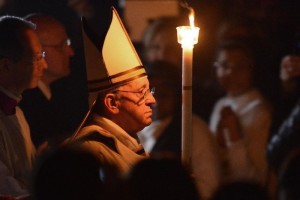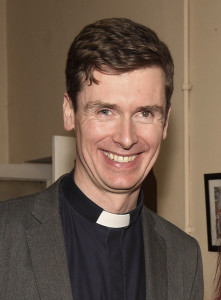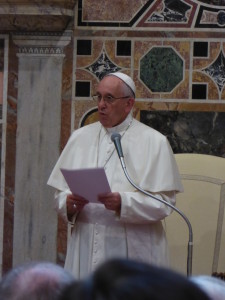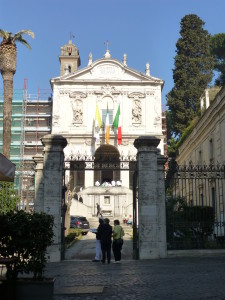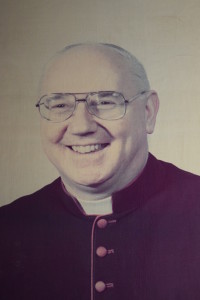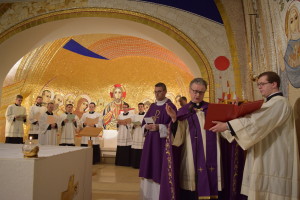Irish College seminarians served at Easter Vigil with Pope
Posted on 26. Mar, 2016 by John Coughlan in Carousel
The seminarians of the Pontifical Irish College, Rome, were invited to serve at the Easter Vigil in St Peter’s Basilica, celebrated by Pope Francis on Holy Saturday night, 26th March 2016.
For photographs of the Irish College participation in the ceremony, click here.
For a video of the ceremony, click here.
Appointment of new Vice Rector
Posted on 16. Mar, 2016 by John Coughlan in Carousel
Fr Paul Finnerty of Limerick Diocese has been appointed as the new Vice Rector of the Pontifical Irish College, Rome, in succession to Fr George Hayes, who will complete his time as Vice Rector at the end of the 2015-16 academic year. For a press release on the appointment, click here.
Picture: Liam Burke/Press 22 via catholicbishops.ie
Pope Francis speaks on priestly formation
Posted on 16. Mar, 2016 by John Coughlan in Carousel
Pope Francis spoke on the topic of seminary formation at the audience he gave to the participants of the conference ‘One Vocation, One Formation, One Mission’, organised by the Congregation for the Clergy to mark the 50th anniversary of the promulgation of the documents ‘Optatam totius’ and ‘Presbyterorum ordinis’ of the Second Vatican Council in November 2015.
For photos of the conference, as experienced by the Pontifical Irish College participants, click here.
Here is the text of Pope Francis’s talk (text from Vatican website):
Cardinals, Dear Brother Bishops and Priests, Brothers and Sisters,
I extend my cordial greetings to each of you, and I express my sincere gratitude to you, Cardinal Stella, and to the Congregation for the Clergy, who invited me to participate in this Conference, 50 years after the promulgation of the Conciliar Decrees Optatam Totius and Presbyterorum Ordinis.
I apologize for having changed the first plan, which was that I should come to you, but you saw that there was no time and even here I arrived late!
This is not a “historical reenactment”. These two Decrees are seeds that the Council has scattered in the field of the Church; over the course of these five decades they have grown, they have become a robust plant, with a few dry leaves, of course, but above all with many flowers and fruits that adorn the Church today. Retracing the path undertaken, this Conference has demonstrated these fruits and has constituted a proper ecclesial reflection on the work that is still to be done in this area that is so vital for the Church. There is still work to be done!
Optatam Totius and Presbyterorum Ordinis were mentioned together, as two halves of a single reality: the formation of priests, which we distinguish as initial and ongoing, but which represents for them a unique experience of discipleship. It was not by chance that Pope Benedict, in January 2013 (Motu proprio Ministorum Institutio), gave a concrete and juridical form to this reality, also giving the Congregation for the Clergy competence over seminaries. In this way the Dicastery itself can begin to take care of the life and ministry of priests from the moment they enter the seminary, working to ensure that vocations are promoted and looked after, and that they may blossom in the lives of holy priests. A priest’s path to holiness begins in the seminary!
Since the vocation to the priesthood is a gift that God gives to some for the good of all, I would like to share some thoughts with you, starting with the relationship between priests and others, according to n. 3 of Presbyterorum Ordinis, which is like a small compendium of the theology of the priesthood, taken from the Letter to the Hebrews: “Priests, who are taken from among men and ordained for men in the things that belong to God in order to offer gifts and sacrifices for sins, nevertheless live on earth with other men as brothers”.
Let us consider these three circumstances: “taken from among men”, “ordained for men”, and present “on earth with other men”.
The priest is a man who is born into a certain human context; there he learns the primary values, absorbs the spirituality of the people and acclimates to the relationships. Priests too have a history; they are not “mushrooms” that suddenly spring in a Cathedral on the day of their ordination. It is important that formators and the priests themselves remember this and are able to take account of this personal history along the path of formation. On ordination day I always tell the priests, the new priests: remember where you were taken from, from the flock, never forget your mother and your grandmother! This is what Paul said to Timothy, and I say it again today. This means that you cannot become a priest believing that one has been formed in a laboratory, no; it begins in the family with the “tradition” of the Faith and with the whole family experience. It must be personalized, because it is a concrete person that is called to discipleship and the priesthood, taking into account that in each case Christ is the Master to follow and after whom to model oneself.
In this regard I like to recall that fundamental “centre of pastoral vocation” which is the family, the domestic Church and the first and most fundamental place of human formation, where the desire for a life conceived as a vocational path can burgeon in young people, to be followed with commitment and generosity.
In families and all the other community contexts — school, parishes, associations, groups of friends — we learn to have relationships with real people, we are moulded by our relationships with them, and we also become who we are because of them.
A good priest, therefore, is first of all a man with his own humanity, who knows his own history, with its riches and its wounds, and who has learned to make peace with it, reaching an underlying serenity, that of a disciple of the Lord. Human formation is therefore a necessity for priests so that they learn not to be dominated by their limitations, but instead to build on their talents.
A priest who is a peaceful man will know how to spread serenity around him, even in the most trying of moments, conveying the beauty of his relationship with the Lord. It is not normal for a priest to be often sad, nervous or harsh of character; it is not okay and it does no good, neither for the priest, nor for his people. If you have an illness, if you’re overwrought, go to the doctor! Go to the spiritual doctor and the medical doctor: both of them will give you medicine that will be good for you! The faithful should not have to pay for the neurosis of the priests! Do not lambast the faithful; be close at heart to them.
We priests are apostles of joy, we proclaim the Gospel, that is, the “good news” par excellence; it is certainly not we who give strength to the Gospel — some believe that —, but we can either help or hinder the encounter between the Gospel and people. Our humanity is the “earthen vessel” in which we safeguard the treasure of God, a vessel which we must take care of, in order to properly pass on its precious content.
A priest cannot lose his roots; he always remains a man of the people and of the culture that engendered him. Our roots help us to remember who we are and where Christ has called us. We priests do not drop from above, but instead we are called, called by God, who takes us “from among men”, so as to be “‘for men”. Allow me to share an anecdote. In the diocese, years ago…. No, not in the diocese, it was in the Society, there was a very good priest, he was young, and had been a priest for two years. He became confused, and spoke with his spiritual director, with his superiors and with the doctors, saying: “I’m leaving, I can’t any more, I am leaving”. After thinking things over — I knew his mother, they were humble people — I said to him: “Why don’t you go to your mom and talk with her about this?”. He went and he spent the whole day with his mother, and he came back changed. His mother gave him two spiritual “slaps”, she told him three or four things, put him in his place, and he went on. Why? Because he went to the root. This is why it is important to never remove the roots of where we come from. In the seminary you have to do mental prayer…. Yes, of course, this must be done, to learn…. But before all else you pray the way your mom taught you, and then you move forward. The root is always there, the root of family, as you learned to pray as a child, even with the same words, begin to pray like that. Then you will go forward in prayer.
Here is the second step: “ordained for men”.
Here is a key point to the life and ministry of priests. Answering God’s call, you become a priest to serve your brothers and sisters. The images of Christ that we take as a reference for the ministry of priests are clear: He is the “High Priest”, close in the same way to God and to mankind; he is the “Servant”, who washes feet and who becomes a neighbour to the weakest; he is the “Good Shepherd”, who always has as his goal the care of the flock.
There are three images that we should look to when thinking about the ministry of priests: sent to serve men, to help them obtain the mercy of God, and to proclaim his Word of life. We are not priests for ourselves, and our sanctification is closely linked to that of our people, our unction for their unction; you are anointed for your people. Knowing and remembering that he is “ordained for men” — the holy people, the People of God — helps a priest not to think of himself, to be authoritative and not authoritarian, firm but not harsh, joyful but not superficial, in short, to be a pastor and not an official. Today, in both Readings of the Mass, we clearly see the people’s ability to rejoice, when the temple is restored and purified, while at the same time we see the chief priests and scribes’ incapacity for joy at seeing Jesus drive the merchants out of the temple. A priest must learn to rejoice, moreover he must never lose the capacity for joy: if he loses it something is not right. I tell you honestly, I’m afraid of rigidity, I am afraid. Rigid priests…. Stay away! They bite you! And I recall an expression of St Ambrose, from the fourth century: “Where there is mercy there is the spirit of the Lord, and where there is rigidity there are only his ministers”. A minister without the Lord becomes rigid, and this is a danger to God’s people. Be pastors, not officials.
The People of God and all of humanity are the beneficiaries of the mission of priests, and all the work of formation is geared toward this mission. Human, intellectual and spiritual formation flow naturally into this ministry, which such formation provides with tools, virtues and personal predisposition. When all of this harmonizes and blends with true missionary zeal, along the path of an entire lifetime, the priest can fulfil the mission that Christ has entrusted to his Church.
Furthermore, what is born of the people must remain with the people; the priest is always “on earth with other men”, he is not a professional in pastoral ministry or in evangelization, who arrives and does what he must — perhaps well, but as if it were a trade — and then leaves to live a separate life. One becomes a priest to be on earth with the people: closeness. And if I may, brother bishops, we bishops should also have this closeness with our priests. This also applies to us! How often do we hear priests complain: “Well, I called the bishop because I have a problem…. The secretary, the secretary told me he is very busy, that he is out, that he will not be able to see me for another three months…”. Two things. The first: a bishop is always busy, thanks be to God, but if you bishops receive a call from a priest and cannot receive him because you have a lot of work, at least pick up the phone, call him and ask: “Is it urgent? Is it not urgent? When, come that day…”, in this way you are close. There are bishops who seem to move away from the priests…. Closeness, at least a phone call! That is fatherly love, fraternity. And the other thing: “No, I have a conference in the city and then I have to make a trip to America, and then…”. But, listen, the decree of Trent concerning residence is still in force! And if you do not feel like staying in the diocese, resign and travel the world doing a different, very good apostolate. However, if you’re the bishop of that diocese: residence. These two things: closeness and residence. This is for us bishops! One becomes a priest to be on earth with the people.
The good that the priests can do is born mainly from their closeness and their tender love for people. They are neither philanthropists nor officials; priests are fathers and brothers. The fatherhood of a priest does so much good.
Closeness, the depths of mercy, a loving gaze: to experience the beauty of a life lived according to the Gospel and the love of God, which is also made concrete through his ministers. God never refuses. And here I think of the confessional. You can always find ways of giving absolution; to welcome the good. But sometimes you cannot absolve. There are priests who say: “No, because of this I cannot absolve you, go away”. This is not the way. If you cannot give absolution, explain and say: “God loves you so much, God loves you. There are so many ways to reach God. I cannot give you absolution; I give you the blessing. But come back, always come back here, and whenever you come back I’ll give you a blessing as a sign that God loves you”. And that man or woman will go away full of joy because he found the image of the Father, who never refuses; in one way or another, he has embraced that person.
This too is a good examination of conscience for a priest: if the Lord were to return today, where would he find me? “For where your treasure is, there will your heart be also” (Mt 6:21). And where is my heart? Is it among the people, praying with and for the people, involved with their joys and sufferings, or is it rather among worldly things, earthly affairs, in my private “spaces”? A priest cannot have a private space, because he is always either with the Lord or with the people. I think of those priests that I knew in my city, when there were no answering machines, who slept with a phone on the bedside table. At whatever time people would call, they got up to give the anointing: no one died without the sacraments! They did not even have a private space when they rested. That is apostolic zeal. The answer to the question “Where is my heart?” can help every priest to guide his life and his ministry toward the Lord.
The Council left the Church “precious pearls”. Like the merchant in the Gospel of Matthew (13:45), today we go in search of them, to bring new impetus and new instruments for the mission that the Lord has entrusted to us.
One thing that I would like to add to the text — sorry! — is vocational discernment, the admission to seminary. Seek the health of that young man, the spiritual, physical, material, physical and mental health. Once, when I had just been appointed master of novices in 1972, I took the results of a personality test to the psychologist, it was a simple test that was done as one of the elements of discernment. She was a good woman, and also a good doctor. She said to me: “This one has this problem, but he can proceed if he does so in this way…”. She was also a good Christian, but in some cases was adamant: “This one cannot” — “But doctor, this young man is so good” — “He is good now, but know that there are young people who unconsciously know, they are not aware of it, but unconsciously they feel that they are mentally ill, and seek strong structures that will protect them in life, in order to go on. And they go on fine, until the moment comes when they feel well established and there the problems begin” — “It seems a bit strange to me…”. And I will never forget her response, it was like that of the Lord to Ezekiel: “Father, have you ever wondered why there are so many police officers who torture? They enter young, they seem healthy but when they feel confident the illness begins to emerge. Those are the strong institutions that these unconsciously sick ones seek: the police, the army, the clergy…. And we all know that there are many illnesses which come out”. It’s curious. When I realize that a young man is too rigid, too fundamentalist, I do not have confidence; in the background there is something that he himself does not know. But when they feel confident…. Ezekiel 16, I cannot remember the verse, but it is when the Lord tells his people all that he did for them: he found them when they were just born, and he clothed them, he espoused them…. “And then, when you felt secure, you prostituted yourself”. It is a rule, a rule of life. Eyes open to the mission in seminaries. Eyes open.
I trust that the result of the work of this Conference — with so many distinguished speakers from different regions and cultures — can be offered to the Church to update the teachings of the Council in a useful way, contributing to the formation of priests, those who are there and those who the Lord will give us, so that, increasingly configured to him, they will be good priests according to the heart of the Lord, not officials! Thank you for your patience.
St Patrick’s Day 2016
Posted on 16. Mar, 2016 by John Coughlan in Carousel
The St Patrick’s Day Mass for the Irish community in Rome was celebrated on 17th March 2016 at 10.00 in Saint Isidore’s Church, Via Degli Artisti, 41. The celebrant was Mons. Ciarán O’Carroll, Rector of the Irish College.
A celebration of Vespers for the feast took place at the Pontifical Irish College in the evening at 19.30.
To view photographs from the day, click here.
Admission to Candidacy 2016
Posted on 17. Feb, 2016 by John Coughlan in Carousel
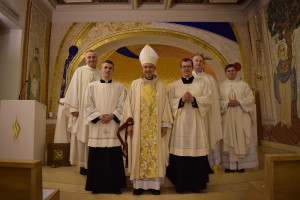
Left to right: Mons. Ciarán O’Carroll (Rector), Mr Malachy Gallagher (new Candidate), Archbishop Jorge Carlos Patrón Wong (Secretary for Seminaries, Congregation for the Clergy), Mr Bill O’Shaughnessy (new Candidate), Fr George Hayes (Vice Rector), Fr Hugh Clifford (Director of Formation).
Malachy Gallagher (Diocese of Derry) and Bill O’Shaughnessy (Archdiocese of Dublin), seminarians of the Pontifical Irish College, Rome, were admitted to Candidacy for Ordination to Diaconate and Priesthood by Archbishop Jorge Carlos Patrón Wong, Secretary for Seminaries of the Congregation for the Clergy on 17th February 2016 at Mass in the College Chapel. The two Candidates will be ordained to the Diaconate on Easter Tuesday, 29th March 2016.
The following is the homily preached by Archbishop Patrón Wong:
I would like to begin by thanking Monsignor Ciarán O’Carroll, the Rector, along with his colleagues on the staff of the College, Fr George (Hayes), Fr Hugh (Clifford) and Fr Tom (Norris), for the kind invitation to preside at this Holy Mass and the rite of admission to candidacy of Malachy and Bill. I am pleased to have this opportunity to return to the Pontifical Irish College and to mark this moment in the life of the seminary community with you.
Reading the Gospel, we might have expected that the Church would have proposed, in the first reading, the account of Jonah being expelled from the belly of the whale. This is the sign of the resurrection of which Christ speaks. Instead, we meet Jonah just as he finds himself on dry land once more, when the word of the Lord is addressed to him for the second time, asking him to call the people of Nin’eveh to repentance. And he set out, we are told, “in obedience to the word of the Lord”.
Christ made clear to his listeners that the sign of Jonah was the sign of their times, although they would only understand this afterwards. In fact, he remains always the living sign of the kairos in which we continue to live. “This is the favourable time, this is the day of salvation”, as we heard St. Paul remind us on Ash Wednesday (2Cor 6:2). The Risen Christ is the living sign of all times and seasons.
Since the resurrection is not an idea, nor even merely an event, but the living reality of a person whom we encounter, Christ addresses himself to each one of us in each generation; and he addresses each generation through us. His death and resurrection questions each new generation; and this he does through us, his ambassadors. Our message, like that of Jonah, belongs to Christ: “be reconciled to God” (2Cor 5:20).
We can notice a similarity between Jonah and the apostles: they fled from their calling. They fled from the fear of confronting the people of their own time with the word. Overwhelmed by their own insignificance and smallness, they were filled with fear. It was the encounter with the living God that took this away.
God, of course, understands our smallness, and chooses us precisely for that reason. The changing of hearts is not our doing, but the work of God. He sends each of his messengers at just the time they are needed, where they are needed, to whom they are needed. Today, for your generation, for your times, in your land, you are those men. He has sought you out, pursued you, given you signs of his concern for you, reassured you, and brought you to this day.
Each of you has been attentive to the word of the Lord for many years, in the changing circumstances of your lives. You have discerned the signs of the times, the signs of salvation time, in your own lives and generation. You have encountered the sign of Jonah and have come to know the crucified and risen Christ. You are now called to stop and consider well what the journey has brought you so far, before you move on.
In this, Jonah has another lesson for us. He too had to experience death and resurrection, as it were, before the word came to him a second time. Likewise the apostles: they had to experience Christ in his death and resurrection before he “opened their minds to understand the scriptures” (Lk 24: 45). This encounter with the person of Christ in his life, death and resurrection, an encounter that begins mystically by our baptism, must be made real, it must be given flesh. Like the apostles, when we have encountered the crucified and risen Christ we can experience both joy and doubt. But the man who has known Christ will be captivated by his presence enough to touch his wounds, which are all around us today. Pope Francis exhorts us continually, as you know, to touch the flesh of Christ, to encounter him in his suffering children. Our encounter with the crucified and risen Christ certainly involves the mystical encounter of the Spirit in prayer and sacramental life; but it is always an encounter with Christ incarnate, crucified and risen: we meet Christ in the flesh: – in the Eucharist, in his body the Church, and in the flesh of all humanity made in his image and likeness and which he has taken to himself.
You are asked if you can be, in the words of today’s rite, “men of discernment”, who recognise and can understand God’s signs, which daily reveal His will for your own generation. How much we need to bring our brothers and sisters to meet and know Christ in a concrete and real way. Hearts are waiting for relief. Lives that are broken by so much confusion are awaiting healing and light. A generation confident of its own lights is casting many into the shadows: it is a culture of waste, as Pope Francis repeats so often, discarding those who do not measure up, those who do not conform to consumption, those we cannot consume.
We can wonder at what difference our word might make, as Jonah did. But it is God’s word that saves; we must be merely its obedient servants. His word is living and true. It will not return to him empty without achieving what it was sent to do (cf. Is 55: 11). Christ is irresistible to true hearts in every generation. As Pope Saint John Paul put it famously: each generation is a new continent to be won for Christ. Or to recall the motto of Blessed John Henry Newman: heart speaks unto heart.
So, Malachy and Bill, you must not be afraid. The ground you will be sent to till is not barren; it is full of potential, it is, even now, awaiting the seed of the word that will be sown by your lives and ministry in the near future. Today, the Church confirms you in your discernment, encourages you to go on, and it begins to prepare you for that day when you will be conformed to Christ as his messengers who go forth in obedience to the his word.
+ Jorge Carlos Patrón Wong
Archbishop – Bishop emeritus of Papantla
Secretary for Seminaries
Ministry of Acolyte 2016
Posted on 30. Jan, 2016 by John Coughlan in Carousel
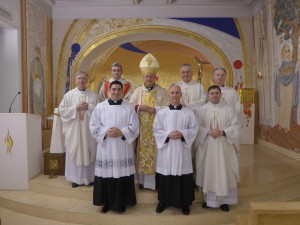
Photographs shows (left to right): Fr Thomas Norris (Spiritual Director), Rev. Stephen Duffy (Deacon for the Mass), Mr Robert Smyth (new Acolyte), Archbishop Claudio Maria Celli (President, Pontifical Council for Social Communications), Mr James Daly (new Acolyte), Mons. Ciarán O’Carroll (Rector), Fr Hugh Clifford (Director of Formation), Fr George Hayes (Vice Rector).
Two seminarians of the Pontifical Irish College,Rome, Robert Smyth and James Daly, both in formation for the Archdiocese of Dublin, were conferred with the Ministry of Acolyte by Archbishop Claudio Maria Celli, President of the Pontifical Council for Social Communications, on 13th January 2016 in the College Chapel. The role of an Acolyte is set out in Pope Paul VI’s Motu proprio, ‘Ministeria quaedam’ of 1972:
‘The acolyte is appointed in order to aid the deacon and to minister to the priest. It is his duty therefore to attend to the service of the altar and to assist the deacon and the priest in liturgical celebrations, especially in the celebration of Mass; he is also to distribute communion as a special minister when the ministers spoken of in the Codex Iuris Canonici can. 845 are not available or are prevented by ill health, age, or another pastoral ministry from performing this function, or when the number of communicants is so great that the celebration of Mass would be unduly prolonged. In the same extraordinary circumstances an acolyte may be entrusted with publicly exposing the Blessed Sacrament for adoration by the faithful and afterward replacing it, but not with blessing the people. He may also, to the extent needed, take care of instructing other faithful who on a temporary basis are appointed to assist the priest or deacon in liturgical celebrations by carrying the missal, cross, candles, etc., or by performing other such duties. He will perform these functions more worthily if he participates in the holy Eucharist with increasingly fervent devotion, receives nourishment from it, and deepens his knowledge about it.
As one set aside in a special way for the service of the altar, the acolyte should learn all matters concerning public divine worship and strive to grasp their inner spiritual meaning: in that way he will be able each day to offer himself entirely to God, be an example to all by his gravity and reverence in Church, and have a sincere love for the Mystical Body of Christ, the people of God, especially for the weak and the sick.’
Monsignor John J. Hanly, R.I.P.
Posted on 21. Jan, 2016 by John Coughlan in Carousel
The death has occurred of the former Rector of the Pontifical Irish College, Rome, Monsignor John J. Hanly.
A native of Oldcastle parish, he was educated at Rockwell, St Finian’s College and the Pontifical Irish College, Rome and was ordained in Rome in 1957. He completed his Doctorate in Ecclesiastical History at the Gregorian University in 1961, writing his Doctoral thesis on“The Conflict Between Blessed Oliver Plunkett and Archbishop Peter Talbot“. In 1979 he published, with translation and commentary, “The Letters of St Oliver Plunkett”. In 1960 he was appointed to the staff of St Finian’s College, Mullingar and in 1966 was appointed Director of Studies at the Pontifical Irish College, Rome. He was appointed Vice-Rector in 1968 and Rector in 1980. During his time in Rome, he was postulator of the Cause of Blessed Oliver Plunkett, the process being completed when the saint was canonised by Blessed Paul VI in 1975. In the 1970s he was appointed Postulator of the Causes of the Irish Martyrs (17 of whom were beatified in 1992 including Blessed Margaret Ball) and of Catherine McAuley and Nano Nagle. Monsignor Hanly was appointed Parish Priest of Laytown-Mornington in September 1987. He served as Vicar Forane from 1999 until 2006. He moved to Carnaross as Parish Priest in September 2008. He died on Wednesday 20 January 2016 after a short illness in Navan Hospital.
The community of the Irish College sympathises with the family of Monsignor John and with the Bishop and Priests of the Diocese of Meath, as well as the faithful of the Parish of Carnaross where Monsignor John had been Parish Priest until his death.
Fr John Silke, R.I.P.
Posted on 21. Jan, 2016 by John Coughlan in Carousel
The death occurred on 13th January 2016 of Dean John J. Silke, Raphoe Diocese, formerly archivist of the Pontifical Irish College, Rome. The community of the Irish College sympathises with his family and the Bishop, priests and faithful of the Diocese of Raphoe.
He was born on 7th May 1926 in Creeslough, Co Donegal and ordained Priest on 22nd June 1956 in Maynooth by Archbishop John Charles McQuaid. He received his primary education in Drimnaraw & Massinass National School, Creeslough. He went to St Eunan’s College, Letterkenny for his secondary education and to St Patrick’s College, Maynooth from where has was ordained to the Priesthood. He was Chaplain to Sacred Heart Convent, Leeson St., Dublin from 1952-1955 whe is studied at the History School in University College Dublin. From 1956-1957 he had a research Scholarship at Salamanca, Spain. From 1958-1959 he studies for the Higher Diploma in Education in Maynooth. From 1955-1966 he was on the teaching staff of St Eunan’s College, Letterkenny. From 1966-1973 he taught and studies at Harriman College, New York and Manhattan College. He was Archivist at the Pontifical Irish College, Rome from 1973-1980. From 1980 – 1981 he was a research fellow in Queens University, Belfast. In 1982 he was appointment Administrator of Glenswilly Parish and in 1983 he was appointed the first Parish Priest of Glenswilly where he reaimed until retiring as Parish Priest in 1992. He was appointed Diocesan Archivist by Bishop Mac Feeley, a position he held until the time of his death. Fr Silke was appointed a Canon of the Cathedral Chapter in July 2006 and then Dean of the Cathedral Chapter in August 2009.
Go dtuga Dia suaimhneas síoraí dó.
Doctoral Defence: Fr Daniel Ihunnia
Posted on 08. Jan, 2016 by John Coughlan in Carousel
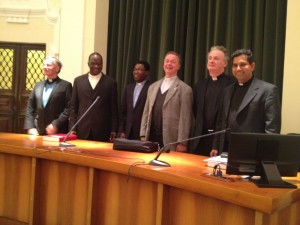
Fr Daniel Ihunnia pictured after his doctoral defence with his moderator and the members of the panel as well as Fr Tom Norris, Spiritual Director, and Fr George Hayes, Vice Rector, Pontifical Irish College.
Congratulations to Pontifical Irish College postgraduate student Fr Daniel Ihunnia of the Missionary Society of St Paul (Abuja, Nigeria) on the successful defence of his doctoral thesis, ‘The identity of the Christian Community in Africa: A study of the pastoral methods in the thoughts of P. A Kalilombe’ at the Pontifical Urbanianum University on 14th December 2015. The moderator for Fr Daniel’s thesis was Professor Paul B.W. Steffen, and the other members of the panel were Prof. Francis A. Oborji and Prof. I.J. Kodithuwakku Kankanamalage.
Carol Service 2015
Posted on 11. Dec, 2015 by John Coughlan in Carousel
A very large crowd attended this year’s Carol Service in the Irish College on Sunday, 13th December 2015 at 17.00. The occasion began with the Advent Service in the Chapel, followed by Christmas carols, and all shared in refreshments after. Fr George Hayes, Vice Rector was the presider and preacher this year.
For photographs of the occasion and video clips of the carols, click here.

